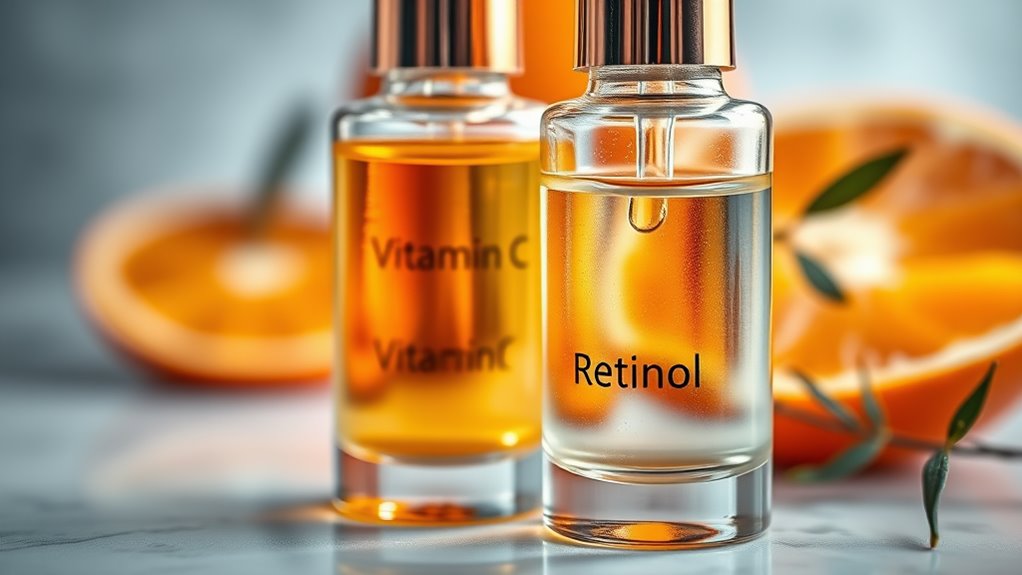Retinol Vs Vitamin C- Which Fights Wrinkles Best.
Did you know that about 80% of visible skin aging is attributed to sun exposure and environmental factors? When it comes to combating wrinkles, two powerful ingredients often come into play: retinol and vitamin C. Each has distinct mechanisms and benefits, making the choice between them crucial for effective anti-aging treatment. Understanding how these ingredients work can help tailor your skincare routine to achieve optimal results. How do they stack up against each other?
Key Takeaways
- Retinol effectively stimulates collagen production and enhances cell turnover, making it superior for reducing fine lines and improving skin texture.
- Vitamin C acts as a potent antioxidant, neutralizing free radicals that contribute to skin aging and protecting against UV damage.
- Both ingredients promote collagen synthesis, but retinol is generally more effective for wrinkle reduction due to deeper skin penetration.
- Hydration is essential for maximizing the anti-aging benefits of both retinol and vitamin C in a skincare routine.
- Consider skin sensitivity; retinol may cause irritation, while vitamin C can lead to stinging, impacting your choice for wrinkle treatment.
Understanding Retinol and Its Benefits for Skin
What makes retinol a staple in the skincare world? Its proven ability to enhance cell turnover, stimulate collagen production, and reduce the appearance of fine lines and wrinkles.
Research shows that retinol, a derivative of vitamin A, penetrates deeply into the skin, effectively addressing signs of aging. When considering retinol vs vitamin C for anti-aging, retinol often outperforms in promoting skin renewal and elasticity. Regular use can lead to smoother, firmer skin, making it a top choice for those battling aging. Additionally, retinol has the added benefit of addressing acne, making it a versatile option for various skin concerns.
However, it’s essential to introduce retinol gradually to avoid irritation while maximizing its benefits for your skin.
The Role of Vitamin C in Anti-Aging
How can vitamin C transform your skin’s appearance as you age?
This powerful antioxidant plays a crucial role in anti-aging by neutralizing free radicals and promoting collagen synthesis.
This potent antioxidant is vital for anti-aging, counteracting free radicals and enhancing collagen production.
Incorporating vitamin C into your skincare routine can offer several benefits:
-
Brightens Skin Tone: Reduces hyperpigmentation and evens out skin tone.
-
Boosts Collagen Production: Stimulates collagen synthesis, enhancing skin elasticity.
-
Protects Against UV Damage: Offers a defense against sun-induced skin damage.
-
Reduces Inflammation: Helps soothe irritated skin and diminish redness.
Utilizing vitamin C can significantly enhance your skin’s vitality and overall appearance as you age. Additionally, studies have shown that scientifically-backed ingredients can further improve skin health when combined with vitamin C.
How Retinol and Vitamin C Work to Reduce Wrinkles
While vitamin C offers significant benefits for skin health, retinol presents another powerful option in the fight against wrinkles.
Retinol, a derivative of vitamin A, penetrates deep into the skin, promoting cell turnover and stimulating collagen production.
This process helps diminish fine lines and improves skin texture.
In contrast, vitamin C acts as a potent antioxidant, neutralizing free radicals and reducing oxidative stress, which contributes to premature aging.
By enhancing collagen synthesis and brightening the skin, vitamin C supports overall skin health.
Together, these ingredients provide a multifaceted approach to wrinkle reduction, targeting different skin concerns effectively. Additionally, incorporating key anti-aging ingredients into your routine can further enhance skin vitality.
Comparing the Efficacy of Retinol and Vitamin C
When choosing between retinol and vitamin C for wrinkle reduction, it’s essential to understand their distinct mechanisms and proven effectiveness.
Both ingredients offer unique benefits, making them valuable in your skincare routine.
Here’s how they compare:
-
Collagen Production: Retinol stimulates collagen synthesis more effectively than vitamin C.
-
Antioxidant Protection: Vitamin C provides superior protection against free radicals, preventing further skin damage.
-
Skin Texture: Retinol enhances skin cell turnover, improving texture and tone faster.
-
Stability: Retinol is generally more stable than vitamin C, which can degrade quickly in light and air.
Additionally, maintaining proper hydration levels is crucial for maximizing the benefits of either ingredient.
Choosing the right one depends on your skin’s needs.
Potential Side Effects of Retinol and Vitamin C
Both retinol and vitamin C are effective in combating wrinkles, but they can also come with potential side effects that users should be aware of.
Retinol may cause irritation, redness, and peeling, especially during initial use.
You might experience dryness or sensitivity, particularly with higher concentrations.
Conversely, vitamin C can lead to stinging or redness, particularly for those with sensitive skin.
Additionally, improper storage can cause vitamin C to degrade, reducing its effectiveness.
It’s crucial to patch-test both ingredients and consult with a dermatologist to tailor your usage and minimize adverse reactions while maximizing the benefits for your skin. Furthermore, overusing these products can lead to irritation and barrier damage, emphasizing the importance of a balanced skincare routine.
Choosing the Right Ingredient for Your Skincare Routine
How do you determine which ingredient—retinol or vitamin C—best suits your skincare routine?
Understanding your skin type and concerns is essential.
Here are four factors to consider:
-
Skin Sensitivity: If your skin is sensitive, vitamin C may be gentler than retinol.
-
Concern Focus: Retinol targets fine lines and wrinkles, while vitamin C brightens and evens skin tone.
-
Application Time: Retinol is often used at night; vitamin C can be applied in the morning.
-
Sun Exposure: Vitamin C offers antioxidant protection during the day, making it ideal for daytime use.
Additionally, personalized skincare routines often yield the best results by addressing your specific needs.
Choose wisely for optimal results.




